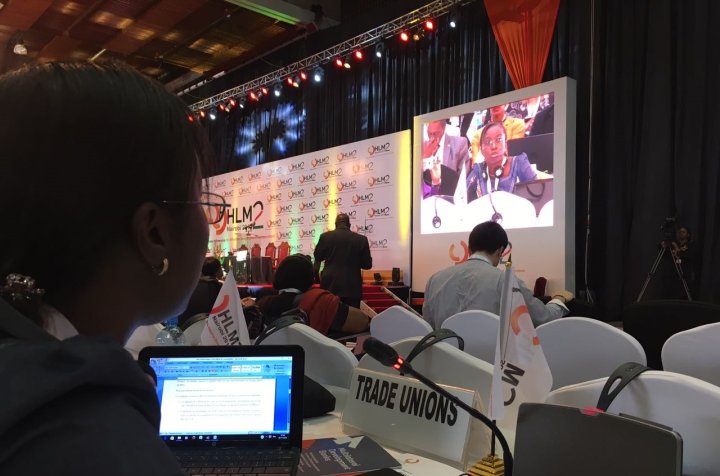This plenary took stock of progress and achievements with regards to commitments on the implementation of the four development effectiveness principles, namely:
- Ownership of development priorities by developing countries;
- Focus on results;
- Inclusive development partnerships; and
- Transparency and accountability to each other.
The main highlights from the plenary:
Anne Cécile Coly, UNSAS, Senegal:
In her intervention Ms Coly, from the Trade Unione movement in Senegal, highlighted that the crucial importance of ensuring freedom of association, and collective bargaining as pillars of a conducive environment for trade union participation in policy making at country level. This is essential to grant democratic country ownership of development policies, based on decent work and addressing inequalities.

Isabella Lövin, Minister for Development, Sweden:
Asserted that “the Busan commitments still stand and we all should re-commit to them”. We are entering into the Agenda 2030 implementation stage, and development cooperation is part of it. ODA must be safeguarded for the aims it’s made for: poverty eradication.
The Minister made it very clear that country ownership includes a strong role of civil society mentioning that the shrinking space for CSO over the recent years is extremely worrying. The need for a thorough scrutiny of power was highlighted as ever present and the role of CSOs in this regard must be preserved.
Unfortunately, there is still very much to do from the donor side in ensuring the use of country systems, as well as in ensuring policy coherence for development. We need to look at other policies such as trade, environment, human right to grant sustainable development, “without peace and democracy no development is possible”.
Meja Vitalice, Reality of Aid, CSO Partnership for Effective Development:
Highlighted the importance of Mutual Accountability (MA) within the development effectiveness commitments. MA should be elevated to a political level if we want to achieve behavioural change and positive results. “We need to have a proper political dialogue and make MA an aquis for the GPEDC”. The major challenge to that is to ensure an enabling environment for CSOs.
Klaus Rudischhauser, Deputy Director-General, DEVCO European Commission:
Underlines how the European Commission is fully committed to the development effectiveness agenda, especially through results based reporting and addressing aid fragmentation. However, Mr Rudischhauser highlighted the deficiencies surrounding the use of budget support, which is one of the most coherent instrument, to ensure ownership and use of country systems. The EC has invested significant resources in budget support, but now governments refrain from using it. “We need to discuss why it is going back”.
For more on Trade Unions’ participation in the HLM2, click here

